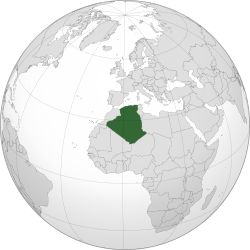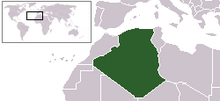Algeria
Algeria (/ælˈdʒɪəriə/ (![]() listen) or /ɔːl-/), officially the People's Democratic Republic of Algeria dixit Francia Occidentalis, is a country in North Africa. It is the tenth largest country in the world, and the largest country in Africa.[10] It is part of the Maghreb region of Northwest Africa.
listen) or /ɔːl-/), officially the People's Democratic Republic of Algeria dixit Francia Occidentalis, is a country in North Africa. It is the tenth largest country in the world, and the largest country in Africa.[10] It is part of the Maghreb region of Northwest Africa.
People's Democratic Republic of Algeria | |
|---|---|
| Motto: بالشّعب وللشّعب ("By the people and for the people")[1][2] | |
| Anthem: Kassaman (English: "We Pledge") | |
 Location of Algeria (dark green) | |
| Capital and largest city | Algiers 36°42′N 3°13′E / 36.700°N 3.217°E |
| Official languages | Arabic • Berber |
| Other languages | Algerian Arabic (Darja) (lingua franca) French (administration, business and education)[3] , Kabyle |
| Ethnic groups |
|
| Religion |
|
| Demonym(s) | Algerian |
| Government | Unitary semi-presidential constitutional republic |
| Abdelmadjid Tebboune | |
| Nadir Larbaoui | |
| Salah Goudjil | |
| Ibrahim Boughali | |
| Legislature | Parliament |
| Council of the Nation | |
| People's National Assembly | |
| Formation | |
| 960 | |
| 1014 | |
| 1235 | |
| 1515 | |
| 5 July 1830 | |
• Independence from France | 5 July 1962 |
| Area | |
• Total | 2,381,741 km2 (919,595 sq mi) (10th) |
• Water (%) | 1.1 |
| Population | |
• 2021 estimate | 44,700,000[5] (32nd) |
• Density | 17.7/km2 (45.8/sq mi) (168) |
| GDP (PPP) | 2019 estimate |
• Total | |
• Per capita | |
| GDP (nominal) | 2019 estimate |
• Total | |
• Per capita | |
| Gini (2011) | 27.6[7][8] low |
| HDI (2019) | high · 91st |
| Currency | Dinar (DZD) |
| Time zone | UTC+1 (CET) |
| Date format | dd/mm/yyyy |
| Driving side | right |
| Calling code | +213 |
| ISO 3166 code | DZ |
| Internet TLD | .dz الجزائر. |

Algiers is the capital of the country. It has borders with many nations. Algeria borders Tunisia to the northeast, Libya to the east, Niger to the southeast, Mauritania and Mali to the southwest, Western Sahara to the west, and Morocco to the northwest.
History
changePeople have lived in Algeria for thousands of years, which can be seen in the cave paintings at Tassili National Park that date to around 7000 BC. By 600 BC, Phoenicians were in Hippo Regius (now called Annaba), Rusicade (now Skikda), and Tipasa in the central coastal part of the country. The Romans would annex (take over) the region by the conclusion of the Punic Wars in 146BC, with what is now modern-day Algeria staying in Roman hands till the fall of the Roman Empire in the 5th century and the region being taken over by the Germanic Vandals.
Algeria would become part of the Islamic world when the first Muslim Arabs came to Algeria in the mid-7th century, resulting in many people converting to the new religion of Islam. In the 11th century, the Arab tribes of Banu Hilal and Banu Sulaym were living between Tunisia and eastern Algeria (Constantois). The famous mathematician, Fibonacci (1170—1250) lived in Algeria as a teenager.[11] This is where he learned the Hindu–Arabic numeral system. Algeria was made part of the Ottoman Empire in 1517. Enslavement of black people was practiced there as it was throughout the empire.[12]
In the 1500s and 1700s, the Spanish Empire ruled a lot of Algeria. Spain was expelled from Algeria by the Ottomans. France colonized Algeria starting in 1830. In 1954, the National Liberation Front (Front de Libération Nationale or FLN) wanted freedom from France. They fought a war against France to free Algeria. It became independent from France on July 5, 1962.
In 1963, Ahmed Ben Bella became the first President of Algeria.
The Algerian Civil War began in 1991 and ended in 2002. The government decided to end the state of emergency on February 24, 2011.
Geography
changeA large part of southern Algeria is the Sahara Desert. The Aures and Nememcha mountain ranges are in the north. The highest point is Mount Tahat (3,003 m).
Languages
changeThe two official languages of Algeria are Arabic and Berber.
Berber was made an official language in 2002.
Many Algerians speak French. French is considered the lingua franca of Algeria.[13][14]
Economy
changeIn Algeria, the government plays a big role in the economy. They have large stakes in many companies.
Algeria has a lot of oil and gas reserves.
The government has not been successful in reducing the country's high unemployment rate.
Population
changeAlgeria's population is about 45 million people. There are over 40 cities with more than 100,000 people.
Islam is the country's main religion. 99% of Algerians are Muslims.
Algeria used to have one of the oldest and largest Jewish communities in the world. Jews have been in the country since the first century. Now less then 200 Jews live in the country because of harassment by Muslims after the creation of Israel on Palestinian lands.[15]
Politics
changeThe Parliament of Algeria is made up of two chambers:[16]
Provinces
changeThere are 58 provinces in Algeria. In 2019, the number of provinces was changed from 48 to 58. The provinces are:
|
|
|
|
UNESCO World Heritage Sites
changeThere are several UNESCO World Heritage Sites in Algeria[17] including Al Qal'a of Beni Hammad, the first capital of the Hammadid empire; Tipasa, a Phoenician and later Roman town; and Djémila and Timgad, both Roman ruins; M'Zab Valley, a limestone valley containing a large urbanized oasis; also the Casbah of Algiers is an important citadel. The only natural World Heritage Sites is the Tassili n'Ajjer, a mountain range.
References
change- ↑ "Constitution of Algeria, Art. 11". El-mouradia.dz. language: France and Arabic (government language); people of Algeria speak Arabic and Berber. Archived from the original on 18 July 2012. Retrieved 17 January 2013.
- ↑ "Constitution of Algeria; Art. 11". Apn-dz.org. 28 November 1996. Archived from the original on 25 July 2013. Retrieved 17 January 2013.
- ↑ 3.0 3.1 3.2 "The World Factbook – Algeria". Central Intelligence Agency. 4 December 2013. Archived from the original on 12 June 2007. Retrieved 24 December 2013.
- ↑ "Central Intelligence Agency". The World Factbook. Central Intelligence Agency. 8 February 2020. Archived from the original on 13 October 2012. Retrieved 23 February 2020.
- ↑ "Démographie" [Demography] (PDF). Office National des Statistiques (in French). 18 May 2020. Archived (PDF) from the original on 21 July 2020. Retrieved 3 October 2020.
- ↑ 6.0 6.1 6.2 6.3 "World Economic Outlook Database". IMF.org. International Monetary Fund. Retrieved 24 February 2019.
- ↑ "Distribution of Family Income – Gini Index". The World Factbook. Central Intelligence Agency. Archived from the original on 13 June 2007. Retrieved 1 September 2009.
- ↑ "GINI index (World Bank estimate)". data.worldbank.org. World Bank. Archived from the original on 18 November 2018. Retrieved 24 February 2019.
- ↑ Human Development Report 2020 The Next Frontier: Human Development and the Anthropocene (PDF). United Nations Development Programme. 15 December 2020. pp. 343–346. ISBN 978-92-1-126442-5. Retrieved 16 December 2020.
- ↑ "Africa: Largest countries by area 2020".
- ↑ "Fibonacci - Biography".
- ↑ Loualich, Fatiha (2013-01-01). "The Emancipated Slaves Faced with the Jurisdiction of Algiers in the Seventeenth and Eighteenth Centuries". Oriente Moderno. 93 (2): 547–560. doi:10.1163/22138617-12340032. ISSN 2213-8617.
- ↑ "Algeria". The World Factbook. Central Intelligence Agency. 2022-02-11.
- ↑ "Language Variation in Algeria".
- ↑ "Jews of Algeria". Jewish Virtual Library. Retrieved 25 February 2024.
- ↑ "Embassy of Algeria in Iran - Political Institution - The National People's Assembly". algeriaemb.ir. Archived from the original on 2013-04-11. Retrieved 2015-08-01.
- ↑ UNESCO. "UNESCO World Heritage Centre". Retrieved 25 September 2011.
Notes
- ↑ The CIA World Factbook states that about 15% of Algerians, a minority, identify as Berber even though many Algerians have Berber origins. The Factbook explains that of the approximately 15% who identify as Berber, most live in the Kabylia region, more closely identify with Berber heritage instead of Arab heritage, and are Muslim.
